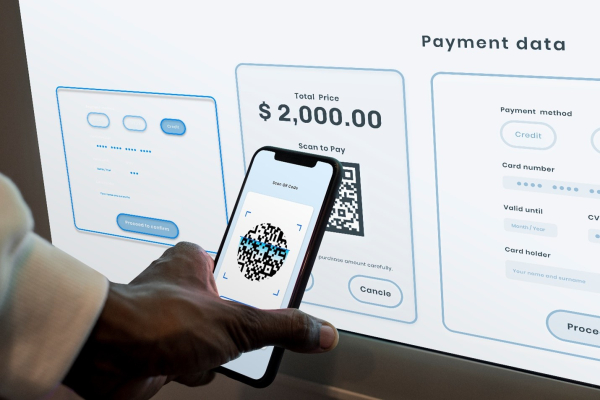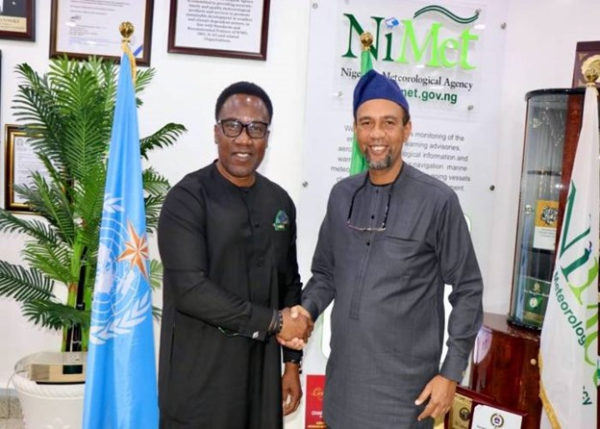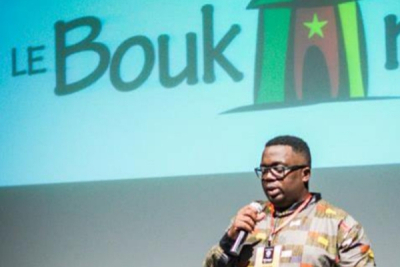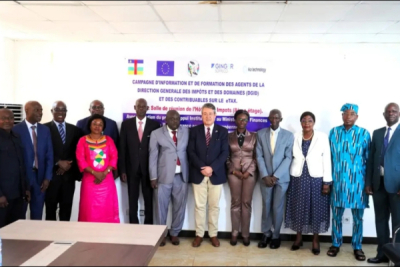X has announced a partnership with Visa as the first official partner for the upcoming X Money Account, set to launch later this year. This collaboration marks a significant step toward transforming X into an all-encompassing financial platform.
Linda Yaccarino, X CEO, revealed yesterday, January 28, that the X Money Account will enable secure and instant funding to the X Wallet via Visa Direct, allowing users to seamlessly connect their debit cards for peer-to-peer (P2P) payments.
Additionally, users will have the option to transfer funds instantly to their bank accounts, enhancing financial accessibility and convenience.
Agriculture remains the largest economic sector in Africa. However, climate variability and extreme weather events pose significant risks, reducing crop yields, increasing post-harvest losses, and threatening livelihoods. Leveraging digital tools could mitigate these challenges.
The Nigerian Meteorological Agency (NiMet) has signed a Memorandum of Understanding (MoU) with MTN Nigeria and advanced weather intelligence company Tomorrow.io to develop a Digital Climate Advisory Services (DCAS) System. The initiative, signed on January 24, 2025, at NiMet Headquarters in Abuja, aims to deliver localized, actionable weather advisories to farmers via mobile SMS to enhance agricultural productivity and resilience.
NiMet Director General and CEO, Professor Charles Anosike, emphasized that the partnership aligns with the government’s food security agenda, ensuring farmers receive timely weather updates to make informed decisions.
MTN Nigeria CEO, Karl Toriola, reaffirmed the company’s commitment to supporting government initiatives and highlighted the broader impact of the project on agriculture, emergency management, and the Nigerian economy.
Nigeria is highly vulnerable to climate change, ranking 160th out of 181 countries in the 2020 ND-GAIN Index, which assesses nations based on their exposure to climate risks, global challenges, and their capacity to enhance resilience. This underscores the urgent need for adaptive measures to safeguard its economy and population.
The DCAS system is expected to empower farmers with real-time weather insights, mitigating climate-related risks and strengthening Nigeria’s agricultural sector. As per the MoU, the parties will work together to develop, implement, and test the DCAS platform, delivering weather-based advisories to farmers via SMS notifications.
This initiative represents a convergence of digital technology, climate resilience, and economic development. By leveraging mobile connectivity to deliver climate-smart solutions, Nigeria can modernize its agricultural sector, enhance food security, and build a more resilient economy.
Hikmatu Bilali
She promotes financial inclusion in Africa, leveraging technology to offer digital solutions to businesses and individuals in Nigeria.
Adaeze Onwumere (photo) is a Nigerian tech entrepreneur and the co-founder and CEO of Aku, a fintech company dedicated to accelerating financial inclusion and economic development across Africa.
Founded in 2019, Aku provides digital payment and banking solutions. Its platform enables users to send and receive money and pay bills via USSD, a mobile app, and other channels. By democratizing access to banking and digital payments, the company aims to foster greater financial inclusion.
Beyond payments, Aku also allows customers and merchants to save and access credit. Its accounts come with no annual or monthly maintenance fees, and all banking transactions are completely free. The Aku app has already been downloaded over 10,000 times on Google Play.
Adaeze Onwumere holds a bachelor’s degree in political science and African studies from Yale University (2012) and earned an MBA from Harvard Business School in 2021.
She began her professional career in 2012 with Econet Global, a pan-African technology company, initially as an intern before spending five years in various roles. She later became head of commercial and operations at Cassava Fintech, a subsidiary of the group. Between 2018 and 2019, she served as chief operating officer at EcoCash Holdings, a company specializing in digital financial solutions.
By Melchior Koba,
Editing by Sèna D. B. de Sodji
He is an experienced entrepreneur, an expert in strategic planning and sales management. He is actively involved in promoting entrepreneurship in Africa.
Jean-Patrick Ketcha (photo) is a Cameroonian entrepreneur and the founder and executive director of Le Boukarou, an organization dedicated to supporting businesses and innovators.
Founded in 2016, Le Boukarou assists young entrepreneurs and women in sub-Saharan Africa by providing modern co-working spaces, mentorship and training programs, as well as funding solutions to help them turn their projects into reality. The organization guides them through every stage, from structuring their ideas to launching their businesses. With the backing of 13 partners, Le Boukarou claims to have reached more than 42,000 people and supported over 40 startups. Among the entrepreneurs it has assisted is Arthur Zang, the inventor of the CardioPad, a connected electrocardiogram device.
Committed to fostering entrepreneurship in Africa, Jean-Patrick Ketcha serves on the strategic advisory board of the Centre d’Employabilité Francophone of the Agence Universitaire de la Francophonie and is a board member of Afric'innov, an association providing support organizations with tools and resources to better assist entrepreneurs across the continent.
Before launching Le Boukarou, he co-founded Spread Ideas Kamer, a non-political association promoting idea-sharing, skill exchange, and the recognition of individual expertise.
Jean-Patrick Ketcha holds a master's degree in law from Paris Nanterre University (2006) and a master's in international business and trade from OMNES Education in France.
He began his professional career in 2010 as a sales manager at Société de Bétons Industriels du Cameroun, where he was promoted to operations director in 2014. In 2016, he joined real estate firm Millenium Immobilier as head of internal control.
By Melchior Koba,
Editing by Sèna D. B. de Sodji
To address the challenge of securing adequate resources, many African countries are embracing digital solutions. These technologies are streamlining tax collection, increasing transparency, and fostering development by making government agencies more efficient and accessible.
The Central African Republic (CAR) has launched e-Tax, a digital platform designed to simplify and improve the collection of taxes and duties. On Monday, January 27, it organized an information and training workshop, in Bangui, to introduce officials from the Directorate General of Taxes and State Property (DGID) to the platform.
Supported by the European Union, the initiative aims to enhance efficiency, increase transparency, and reduce the costs associated with tax administration. “Modernizing the tax administration through digitalization is a key lever for improving public revenue collection, ensuring transparency, and strengthening the fight against tax fraud,” said Jean Marc Dewerpe, head of cooperation for the European Union in CAR.
The adoption of e-Tax reflects the Central African government's commitment to modernizing public services and strengthening the country’s financial autonomy. So far, 301 large companies and 325 medium-sized enterprises have already been registered on the platform, and many taxpayers are beginning to benefit from its advantages. The system introduces features such as online tax filing and electronic payments.
The successful implementation of e-Tax is expected to significantly improve tax collection, reinforce citizens' tax compliance, and ensure greater transparency in public administration. With this initiative, the country also aims to bridge its gap in the E-Government Development Index (EGDI), where it currently ranks 182nd worldwide with a score of 0.0947 out of 1, according to the United Nations.
Samira Njoya
The Innovators for Impact (i3) initiative is now accepting applications for its third cohort, aimed at ventures dedicated to improving access to affordable, high-quality health products and services across Africa. Applications will remain open until February 28, 2025, with the final cohort announced on April 30, 2025.
Eligible ventures must focus on addressing healthcare needs in Africa and have a legal presence or headquarters on the continent. They should provide tech-enabled solutions that enhance pharmacy services, excluding businesses solely focused on research.
This initiative seeks to empower innovators who can bring meaningful change to Africa’s healthcare landscape through partnerships, funding, and support.
In an increasingly digital global economy, there is a critical need to equip the continent’s youth with the skills required to thrive. Diversification into the digital sector is essential to build resilience, foster innovation, and create sustainable growth opportunities.
The International Trade Centre (ITC) has launched the "Sierra Leone: Empowering Youth through Digital Technologies" (READY Salone) project, it announced on January 24. Funded by the Korea International Cooperation Agency (KOICA), the four-year initiative will harness the potential of Sierra Leone’s youth, particularly women and persons with disabilities, to thrive in the digital economy.
During the project’s launch, ITC Executive Director Pamela Coke-Hamilton emphasized the transformative role of digital skills: “Trade is digital. It’s how business happens now, and young people are leading the way. Through READY Salone, we’re partnering with government and business to create a digital-friendly environment and build the online skills of youth, women, and persons with disabilities.”
READY Salone focuses on four key pillars: enhancing digital literacy, improving entrepreneurial competitiveness through upskilling, strengthening tech-focused business support services, and developing inclusive national digital strategies. Through this initiative, 3,000 youth and 250 micro, small, and medium enterprises (MSMEs) will access digital skills training and business opportunities, while an awareness campaign will reach 10,000 young people, encouraging digital careers and entrepreneurship.
The event also featured a slogan competition with 100 youth participants and discussions with financial institutions on advancing inclusive finance for women and launching a Skills for Youth Employment Fund (SkYE Fund) for Sierra Leonean youth.
The READY Salone project aligns with Sierra Leone’s National Digital Development Strategy (NDDS) which focuses on improving digital infrastructure, enhancing digital literacy, and fostering innovation and entrepreneurship. The strategy reinforces efforts to bridge digital and economic divides by fostering inclusion, with a particular focus on women, rural communities, and marginalized groups, such as persons with disabilities (PWD).
Haja Salimatu Bah, Minister of Communication, Technology, and Innovation, highlighted the alignment, stating, “The READY Salone project’s focus on creating digital jobs and successful digital freelancers aligns perfectly with our national goals. We look forward to collaborating with ITC to amplify the impact of our work.”
Hikmatu Bilali
The government has ambitious goals for the digital economy this year, with expanding high-speed connectivity at the forefront. Improving and expanding high-speed internet access is a top priority. While fiber optics remain crucial, the government is also exploring other technologies to achieve this goal.
Guinea is moving closer to launching a satellite to strengthen its digital sovereignty and technological capabilities.
On Friday, January 24, Rose Pola Pricemou, Minister of Posts, Telecommunications, and the Digital Economy, met with a delegation from AirSAT Technology, a Chinese company specializing in commercial satellite solutions, to discuss potential collaboration on the project.
According to a ministry statement, the satellite project aims to facilitate large-scale data transmission and lay the groundwork for technological skills transfer in the aeronautics sector. The initiative also includes plans to train local engineers to manage processes related to the operation and maintenance of satellite technologies.
This initiative aligns with Guinea's push for digital sovereignty. Such a project could be a turning point for the country, equipping it with a critical tool to modernize its telecommunications and reduce dependence on foreign infrastructure.
According to Space in Africa’s 2023 Annual Report on the African space industry, the sector was valued at $19.49 billion in 2021, with projected growth of 16% by 2026, reaching $22.64 billion.
By pursuing this ambition, Guinea could join the ranks of African nations leveraging space technologies to support their development. To date, nearly fifteen African countries have invested over $4.71 billion in 58 satellite projects, with further developments underway. Nations such as Nigeria, South Africa, and Kenya are already utilizing their satellite capabilities to enhance internet connectivity, monitor climate change, and optimize natural resource management.
By Samira Njoya,
Editing by Sèna D. B. de Sodji
The Telecommunication Union's 2024 Global Cybersecurity Index highlighted Africa's significant cybersecurity gap compared to other regions. It also suggested that with the right policies and investment incentives, the continent can rapidly improve its cybersecurity posture.
The African cybersecurity market holds significant economic potential for both local companies and international investors, despite facing various challenges. According to Mordor Intelligence, the market, valued at $0.6 billion in 2024, is expected to grow to $1.28 billion by 2029, reflecting a compound annual growth rate of 13.5%.
The World Economic Forum's Global Cybersecurity Outlook 2025 report reveals that 36% of businesses are skeptical about their country's ability to manage a critical infrastructure cyberattack. Additionally, 27% remain neutral on the issue, while only 9% express confidence, highlighting the continent's vulnerability to escalating threats in an increasingly digital landscape. Ransomware attacks are particularly prevalent, targeting sectors such as finance, email, social media, and critical infrastructure, including energy and transportation, as noted in Interpol's 2023 African Cyberthreat Assessment Report. These attacks disrupt economies and undermine public trust, with African banks experiencing a notable increase in attacks on their digital payment systems.
Several factors contribute to this vulnerability. Many African countries have inadequate cybersecurity budgets and face a significant shortage of skilled professionals. While some nations have implemented data protection legislation, many still lag behind. Furthermore, businesses and citizens often underestimate the severity of cyber threats. According to Orange Cyberdefense's 2023 Security Navigator report, cyberattacks could result in a 10% loss in GDP across Africa, with extortion cases rising by 70% in 2023. This situation presents a real opportunity for developing solutions tailored to the continent's specific challenges. African universities and training centers can expand their curricula to meet the growing demand for qualified professionals, while local startups can innovate by creating products and services that address local needs.
Cybersecurity is essential for Africa's successful digital transformation. Addressing existing weaknesses is crucial for building trust and ensuring resilience in the digital age. African governments can support this transformation by implementing policies that foster innovation and investment in cybersecurity solutions tailored to the unique context of the continent.
Samira Njoya
Launched in 2022, the Ivorian fintech offers a range of financial services to local communities. To accelerate its growth, it has forged strategic partnerships with organizations such as La Poste and the Coffee and Cocoa Board.
Push CI is a fintech solution developed by Ivorian company SEAD Group SA. It offers an all-in-one mobile account linked to a virtual or physical Visa card to simplify financial management for its users.
Launched in 2022 by Steven Bedi, along with Selma Ouiguini, a former Société Générale executive, the Abidjan-based startup provides a mobile app available on iOS and Android. The app, which has surpassed 100,000 downloads according to Play Store data, enables users to create an account and access a full range of digital financial services tailored to both individuals and professionals.
Linked to a phone number, the account provides two types of international Visa cards: a physical card (priced at 5,000 CFA francs, about $8) for in-store payments, ATM withdrawals, and online purchases worldwide; and a free virtual card for secure online transactions.
Push CI enables users to send and receive money instantly, both to other Push accounts and via leading mobile money operators. The app also allows users to pay utility bills – electricity, water, and internet – and top up their phone credit with a few clicks. Users have real-time access to detailed transaction histories for effective financial tracking.
To cater to users without internet access, the fintech provides a USSD code for accessing all its services. Additionally, the customer service center offers multilingual support in French, Dioula, Baoulé, Bété, and Mooré.
In January 2025, Push CI was selected alongside nine other Ivorian startups for the Ivoire Tech Champions Challenge. Winners will enjoy various benefits, including a visit to Silicon Valley in the United States from February 24 to 28, 2025.
By Adoni Conrad Quenum
Editing by Feriol Bewa
More...
He is an experienced creative director with strong expertise in visual communication and marketing. As an entrepreneur, he has specialized in finance and e-commerce.
Mohammed Awami (photo) is a Tanzanian tech entrepreneur and the founder of Elevt Financial Technologies, a company specializing in fintech solutions.
Founded in 2024, Elevt Financial Technologies provides integrated working capital solutions aimed at fostering the growth of small businesses and their customers. The company offers low-interest loans, enabling businesses to expand and improve their operations.
Elevt's platform features an innovative payment solution called Tap to Pay, which transforms smartphones into payment terminals. This functionality supports several contactless payment methods, including credit and debit cards, Apple Pay, Google Pay, and mobile money services. The platform also offers users detailed sales reports, giving them a clear view of their business performance.
Before founding Elevt Financial Technologies, Mohammed Awami launched Settlo in 2021, an omnichannel commerce platform based in East Africa. Settlo transforms business management for merchants, covering in-store sales, e-commerce, payments, and business performance analytics.
Awami holds a diploma in computer-aided publishing and digital image design, earned in 2009 from the AAA School of Advertising in South Africa. He began his career in 2005 as a graphic designer at Livewire Studios, a production and audio engineering studio. He subsequently worked as a graphic designer at Aggrey & Clifford, an advertising agency, in 2008. Awami later served as an art director at Lowe Scanad Tanzania, a communications agency, from 2011 to 2014, and at AIM Group, a Tanzanian digital media agency, from 2018 to 2021.
By Melchior Koba,
Editing by Sèna D. B. de Sodji
Her goal is to empower businesses to succeed. She provides expert guidance in finance, marketing, and technology.
Ebby Gatamu (photo) is a Kenyan marketing expert and entrepreneur. She is the co-founder and CEO of Cladfy Financial Services.
Founded in 2022, Cladfy provides microfinance lenders with modern solutions for loan management, credit assessment, and access to competitive financing. The company helps lenders confidently issue loans, streamline internal processes, and grow profitably.
The Cladfy platform integrates credit assessment models and features a dashboard enabling staff to visualize loans, deposits, expenses, and other reports. It also facilitates communication between lenders and their clients through automated web notifications, two-way SMS, and emails.
In addition to her role at Cladfy, Ebby Gatamu is the co-founder of Adshop Online, a digital marketing agency established in 2017. As a preferred rate service provider (PRSP), the agency offers digital marketing solutions. She also mentors startups at Wentors, an organization supporting women in technology.
Gatamu holds a bachelor’s degree in marketing from the University of Nairobi. Her professional journey began in 2011 at KPMG East Africa, where she worked as an audit advisor. Two years later, she became a project manager at Kenya Airways. In 2018, she took on the role of head of marketing and e-commerce at Vivo Activewear, a fashion company.
In 2019, Gatamu joined Digiduka, a digital payments provider, as marketing director. From 2020 to 2022, she served as director of customer experience at Alfluence, an AI-powered influencer marketing platform in Africa.
By Melchior Koba,
Editing by Sèna D. B. de Sodji
He is a solutions architect, specializing in digital transformation and innovation strategy. He has extensive experience in the finance, consulting, and technology sectors across Africa.
Babatola Awe (photo) is a Nigerian computer scientist and tech entrepreneur. He is the co-founder and CEO of Revent Technologies, a company specializing in the development of technological solutions.
Founded in 2020, Revent Technologies provides tailored technology solutions and software development services for businesses of all sizes. The company also specializes in areas such as cloud computing, big data, artificial intelligence, machine learning, and cybersecurity.
Among its innovations, Revent Technologies has developed several cutting-edge solutions. For instance, Flowmono is a comprehensive platform that streamlines interactions between individuals, data, data-generating processes, and intellectual property within organizations. The company also launched Vybecash, a platform designed to enhance digital payment experiences through services like financial account management, transfers, bill payments, and savings.
In addition, Babatola Awe co-founded Revent Advisory Partners in 2020, focusing on the finance, technology, and human resources sectors. In 2022, he launched Revent Academy, where he also serves as CEO, aiming to equip the younger generation with essential tech skills.
Babatola Awe graduated from the University of Ibadan with a bachelor’s degree in computer science in 2008. He began his professional career in 2010 at AXA Mansard Insurance as an executive assistant and software developer.
In 2012, he joined First Bank Nigeria as an assistant banking client officer before becoming a senior analyst for customer and payment solutions. Between 2018 and 2020, he worked at Deloitte as a digital consultant.
By Melchior Koba,
Editing by Sèna D. B. de Sodji
Data centers are critical to Africa's digital development as they provide the foundational infrastructure for storing, processing, and transmitting data. The expansion of data centers in Africa supports digital transformation, accelerates innovation, and boosts economic growth by attracting investments and enabling businesses to scale in a rapidly evolving digital economy.
PAIX Data Centres, a provider of digital infrastructure in Africa, has announced the construction of a state-of-the-art data centre in Dakar, Senegal, marking a significant milestone in its West African expansion. This new development, revealed on January 27, underscores PAIX’s commitment to meeting the growing demand for high-quality digital infrastructure across the continent.
For Boubacar Fall Sy, Managing Director of PAIX Data Centres Senegal, “The construction of this new data centre in Dakar demonstrates our commitment to the development of digital infrastructure in West Africa. We look forward to providing local and international businesses with world-class colocation and connectivity services, facilitating their digital transformation.”
The PAIX Dakar facility is designed to meet the highest global standards, offering 1.2 MW of IT load to ensure a stable power supply for critical operations, 918 m² of colocation space to provide scalable hosting solutions, and 330 secure bays for IT equipment in a controlled environment. The first phase of the project is set to be operational in 2026, enabling businesses to access reliable connectivity and world-class colocation services.
Aligned with its environmental goals, PAIX aims to use 100% renewable energy for its data centres by 2030. The Dakar facility will incorporate innovative design strategies to maximize efficiency, minimize water consumption, and reduce its carbon footprint, supporting Senegal’s sustainability efforts.
Dakar, already a critical connectivity hub with submarine cables such as ACE, MainOne, SAT3, and SHARE, will soon benefit from the 2Africa cable, further positioning the new data centre as a strategic access point for businesses targeting West African markets. The facility will provide essential digital infrastructure to support innovation, bolster competitiveness, and drive economic growth in the region.
The project will have a significant socio-economic impact. It is expected to create 200 construction jobs and 20 full-time operational roles while also providing opportunities for local suppliers, including architects, contractors, and maintenance providers. This development will strengthen Senegal’s digital infrastructure, attract international investment, and foster technological growth.
The number of data centres in West Africa surged from 2 to 47 between 2012 to 2022, according to the World Bank's 'Digital Progress and Trends Report 2023,' reflecting the region's accelerating digital transformation. This trend aligns with the Digital Senegal 2025 strategy, which seeks to position the country as a leader in the digital economy, underscoring the critical role of infrastructure like the new PAIX data center in achieving these objectives.
Hikmatu Bilali















